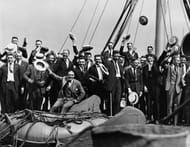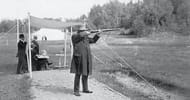The Summer Olympics had been a roller coaster up until now. It had seen various cities. However, none were prepared for the disasters that lay ahead. The next Olympics were scheduled for Berlin in 1916. However, before that, the World War set in. As if that was enough, the Spanish flu added fuel to the fire.
Following the double disasters, the Olympics were shifted to Antwerp in Belgium. These Games were to be shown as a symbol of peace and it did prove to be one. Although it wasn't as successful as Stockholm, it did set records of its own.
Like other Olympics, the Antwerp edition also had its fair share of several firsts. For the first time, plated medals were given to the winners and the Olympics oath was officially voiced. As a peace symbol it was at these Olympics that the doves were flown for the first time. Also, it was at the Antwerp Games that the Olympic flag was first displayed.
The Antwerp edition was also the last edition for the Grand Old Man of Olympics. Having made his debut at the London Games, Oscar Swahn made his final appearance here. At the ripe age of 72 years, he still claimed a silver medal for himself in the running deer team shooting competition.
At these Games, we also saw the rise of a Finnish talent, Paavo Nurmi. An unassuming athlete, he surprisingly won four medals here, including three gold medals in long distance running. He further won five gold medals at the Paris Olympics in 1924. He was nicknamed 'The Flying Finn' and was given the honor of lighting the Olympic cauldron at Helsinki Olympics in 1952, his own hometown.
Not many know this, but owing to persistent lobbying from industrialist Dorabji Tata, India also returned to the Olympics. As a team, India made their Olympic debut in 1920, when five Indians competed under the British-Indian flag in Antwerp. A wrestler, Ranvir Shinde, almost earned Olympic honors for British India, but bad luck prevented him from doing so.
Here are some more interesting facts about the sixth edition of the Summer Olympics, held in Antwerp, Belgium.
First post-war, post-pandemic Olympics:

Like the 1908 London Olympics, Antwerp was not the original choice. In fact, they did not even anticipate an Olympics in their city. The Olympics were originally due in Berlin in 1916.
However, the Games got canceled due to the first World War. Nobody anticipated that a political assassination in Serbia would escalate into a huge military conflict so quickly. However, it did happen and the Games were postponed until the end of the war. Naturally, Berlin lost the right to host the Olympics for the time being.
The war almost ended in 1918, when the rise of a pandemic threatened the arrival of the Games again. Long before the dilemma with the Tokyo Games, the Spanish flu had almost threatened the return of the Olympics.The deadly pandemic arrived in early January of 1918 and unleashed its full power, claiming more than 50 million people worldwide.
The second wave, which began in November 1918, almost threatened to destroy the chances of both returning to normal life and the Olympics. Thankfully, despite the second wave being lethal, it disappeared as quickly as it had come. By 1919, things were coming back to normal.
The Last Olympics for the Grand Old Man of Olympics

The Antwerp Games were also the last edition for the Grand Old man of Olympics. Oscar Swahn, the great old Swedish shooter, participated for the last time in the event. He took part in the running deer team event with the Swedish team.
At a time when people are thinking of retiring, Oscar made a surprising debut at the London Games in 1908. Oscar was 61 years old when he made a golden debut. He won two gold medals and one bronze medal in the running deer events.
However, it seemed that it wasn't enough for the old champion. Oscar returned with a bang to the Stockholm Olympics. In 1912, he won a gold medal in the single shot running deer event. He doubled it up with a bronze medal in the double shot running deer event.
However, at the Antwerp edition, Oscar made a grand farewell. Although he couldn't do it in style, it was special nonetheless. Oscar was 72 years old when he won a silver medal in the running deer team event. Till date, he is the oldest Olympian ever to win a medal for the same.
Rise of Paavo Nurmi

The Olympics are well known for giving innumerable legends. If Athens gave us Spyridon Louis, and Antwerp gave us Oscar Swahn, Antwerp also saw the rise of a legend. His name was Paavo Nurmi.
Nicknamed 'The Flying Finn', Paavo Nurmi is to Finland what Jesse Owens is to the USA, or what Milkha Singh is to India. Born into a working class family, Paavo was inspired by the feats of Juho Pietari Hannes Kolehmainen, a Finnish Olympic champion. He left school at the age of 12 to provide for his family, but never gave up on his Olympic dreams.
Joining the Finnish military service, Paavo developed a strict training program. Paavo won a silver medal in the 5000m event. However, he surprised everyone when he took gold in the 10,000m and the cross country events. His best was yet to come when he outshone everyone at the Paris Olympics in 1924.
Paavo was accorded the honor of 'Flying Finn' for his incredible feats. He was even accorded the honor of lighting the Olympic cauldron at the Helsinki Games in 1952.
End of tug of war as an Olympics sport
![Tug of War for one last time [Image for Representational Purposes]](https://staticg.sportskeeda.com/editor/2021/07/054f2-16263113811292-800.jpg?w=190)
The Antwerp Games brought back field hockey to the Olympics. However, the quadrennial event was also the last edition, where the tug of war was played.
Yes, tug of war was once an Olympic sport. Introduced at the Paris edition in 1900, the sport was played by clubs. The tug of war was officially contested as a team event in the Olympics from 1900 to 1920.
Countries could enter more than one club in the competition, making it possible for one country to earn multiple medals. This happened twice - in 1904, when the United States won all three medals, and in 1908 - when the podium was occupied by three English teams.
In the Antwerp edition, 40 competitors from five nations participated for one last time in the final edition. At these Games, the gold medal was once again won by the team of Great Britain. They had defeated a team from Netherlands to win the top honors. The bronze medal was won by the hosts Belgium. They defeated the United States of America to win the coveted podium spot. Ever since then, tug of war has never seen the light of the day.
Return of India to the Summer Olympics
![India at Antwerp Olympics [Image for Representational Purposes]](https://staticg.sportskeeda.com/editor/2021/07/cc24b-16263114908363-800.jpg?w=190)
In 1900, Norman Pritchard, an Anglo-Indian soldier, participated as the lone representative of both India and Asia at the Paris Olympics.
Two decades later, things had changed for the good. In his opening remarks during a 1919 sports meeting at the Deccan Gymkhana, acclaimed industrialist and sports lover, Sir Dorabji Tata expressed a desire for India to take part in the forthcoming 1920 Olympics.
He requested the then Governor of Bombay Lloyd George, who presided over and distributed prizes at this sports meet, to secure representation for India at the Olympics through the British Olympic Committee. As a result, in February 1920, the International Olympic Committee granted the British colony of India affiliation to participate in the Olympic Games.
Following persistent selections, Purma Chandra Bannerjee was selected as the captain of the Indian contingent. He would be accompanied by long distance runner PD Chaugule, fellow runner Sadashiv Datar and K Kaikadi, and wrestlers Ranvir Shinde and K Nawale. Sohrab H. Bhoot was the manager and Dr. A H A Fyzee was the medical officer and adviser for the team.
While the team didn't perform very well, Ranvir Shinde was one rare exception. He surprised everyone by storming into the semi-finals. However, he lost to the American wrestler, and further lost the bronze medal bout. Had he won at least one of them, Ranvir would have been an international sensation much before Team India came on center stage in 1928.
